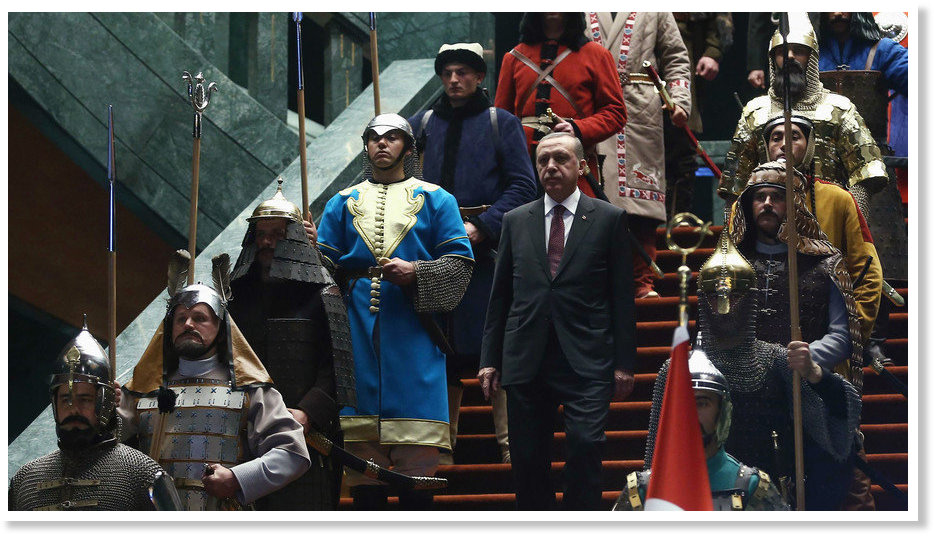Turkey’s long-term strategy in destabilizing Libya, the Middle East, and the Eastern Mediterranean
Turkey is trying to assert itself across the swath of Iraq, Syria and now all the way to Libya, with its eyes set on having power not seen since the Ottoman Empire more than 100 years ago. Turkey’s assertion of power over half the Mediterranean Sea has a rippling effect on the entire region.
Mr. Erdogan desires to be a key player amid the geopolitical changes in the Middle East and the Eastern Mediterranean, as Turkey seems to acquire regional superpower status. Turkey is obviously trying to consolidate its status in the region, in cooperation with Russia.
All that means that President Erdogan has managed to be involved in everything. Lately, he is considered a key factor in any Libya developments and he is treated as a major player in geopolitical readjustments in the wider region.
Anastassios Tsiplacos - Managing Editor
Why Libya’s civil war continues…
Libya is a sprawling chaos, and not just because of the fighting between Haftar’s LNA and the UN recognized government in Tripoli. Nor is it because of the scores of private/tribal/jihadist militias that terrorize what is left beyond the territories not controlled by Haftar and the Tripoli government. Libya, has become, like Syria, the battlefield for a proxy war between opposing forces that are now embroiled throughout the Middle East, the Gulf, and the Maghreb. The lines that were first drawn years ago when the so-called “Arab Spring” destabilized regimes throughout the region and led to the mess we see today, linger…
The Libyan civil war is a highly complicated geopolitical issue of extremely significant economic importance to Europe, and there are already many players involved. So many that it is difficult to come to an agreement. Some of those players seem to have an unstated but clear interest in controlling the energy flow to Europe for political gain.
The new adversaries, of course, include the USA and Russia. Siding with Russia, at this point are Syria, Iran, while Turkey and Qatar are courting and being courted by this group. The US has a staunch ally in Israel, strong allies in Egypt , Saudi Arabia, and the UAE. It has been a much more vocal and active supporter of Greece and Cyprus, and there is renewed cooperation with France.
The EU strives to find a coherent position, while at the same time is trying to remain in the picture of the Libyan crisis as a primary actor.
The UK is mired with all the Brexit business and has interests in maintaining a shadowy condition as a “guarantor” power for Cyprus.
China has its own problems with the US in another part of the world, and in this theater is just biding time.

Hydrocarbons are the pivot in this issue, as it is in this whole conflict. All the players are hydrocarbon producers, or wanabees. At a first glance, hydrocarbons permeate the playing field. Crises in these hydrocarbon producing regions, in many ways rule the world. All major players are Oil and NG producers, and their proxies “sit astride” transit routes, or dream of the conquest and piracy of the sources of others, and who are more than willing to taste the plunder.
The Libyan problem has an important impact in the European Union as Libya is a major oil producer of sulfur-free crude. In this context, at the very same time of the Berlin Conference, the leader of the Libyan National Army (NLA) General Khalifa Haftar shut down a major oil pipeline and stopped all oil exports from ports under his control. LNA controls most of the country except the capital Tripoli and its surroundings and it also controls most of the oil fields, giving it substantial economic leverage.
The Berlin Conference
The Berlin Libyan Conference ended Sunday leaving the impression of a public policy exercise set by Germany in an effort to reclaim its leading role in Europe. However, the Conference did not yield a result which would justify its purpose, as no cease fire was agreed. The Conference was successful in the sense that the organizers managed to get both belligerent parties, not to speak directly to each other but to speak separately with all other actors, which is quite something. The Conference concluded with a document, a kind of roadmap showing how to achieve a durable cease fire (if and when), and this is also positive.

The Berlin Conference unanimously agreed, as Chancellor Angela Merkel said, to respect the arms embargo set by the UN and to control it more effectively than it has been in the past. Such a decision clearly implies that the Conference decided to keep equal distances from the belligerent parties, despite previous open support to Libya’s UN-recognized Government of National Accord (GNA) under Prime Minister Fayez Sarraj. This stance paves the way to build relations with General Khalifa Haftar who now seems to have a greater chance to win the Libyan civil war.
The European Union is trying to remain in the picture of the Libyan crisis as a primary actor. Commission President Ursula von der Leyen and EU High Representative Josep Borrell committed to play an important role in the Libyan civil war and are ready to contribute “to the monitoring of the ceasefire and the respect of the arms embargo.” Which cease fire and with what army the EU will support its role, however, neither mrs. von der Leyen nor mr. Josep Borrell provided any details.
Erdogan’s Africa Campaign
Turkey’s hard power tactics on Libya perhaps paved the way for the Berlin summit by provoking the international community to take action against Turkey’s unilateral moves, but the final communique that the foreign powers agreed on during the conference are conflicting with Ankara’s interests and military plans.
In Libya, it’s Haftar’s NLA and its allies against the UN-recognized government in Tripoli. All factions employ direct involvement and proxies. War by proxy usually means civil war and the key link to all these conflicts is mr. Erdogan’s Turkey. Turkey’s obvious interference has solicited the opposition of its enemies. Turkey, and to a large extent Qatar seem to have been implicated in all developments that have taken place since the “Arab Spring”. At that time, Turkey was allegedly involved in fomenting “Jihadist” revolution, in an alliance with the Muslim Brotherhood.
Turkey dreams, under President Erdogan, or arguably on a deeper geopolitical level, of becoming a regional power. Under AKP control Turkey has become far more revisionist and aggressive, attacking in neighboring Syria and Iraq with utter impunity, not by proxy, but with Turkish forces and mercenaries. At the same time, in his commitment to the Muslim Brotherhood and its offshoots, and their use for his own purposes, mr. Erdogan has been eager to facilitate them, throughout the Muslim world, and its diaspora. However, the backing of Morsi in Egypt had backfired and led to the enmity of the most populous and militarily strongest Arab country.

Turkey has decided to involve itself in Libya too. President Erdogan believes himself to be the final arbitrator in the Eastern half of the Mediterranean, according to what he sees as his, and Turkey’s, interests, or rather the interests of those Turks that support him. In his dreams, he envisions a world where Turks rule over the Holy cities of Islam, restitution of Ottoman glory. This is not just his dream. It is the dream of many parties in Turkey, and was in line with what Gulen, Ahmet Davutoglu, and Abdullah Gul, Erdogan’s ousted former allies, had said in happier, for Turkey, times.
Turkey’s military assistance
Turkey is directly backing the UN-recognized government in Tripoli. This he does with vehicles, weapons, Bayraktar TB2 drones and “advisors” who also operate some of the more sophisticated equipment, and doubtlessly with cash, the source of which at this time of crisis in the Turkish economy, is unknown. High-ranking Turkish officers are on Libyan soil, along with technicians, support, and SpecOps troops. Some 80 Turkish military personnel are currently in Tripoli. About 10 Turkish officers are training cadets at the Mitiga military academy, while others are involved in train-and-equip activities. The most recent group sent to Libya, about 40 servicemen, will operate the Milkar-3A3 V/UHF radio jammer system, provided by Turkey for electronically jamming Tripoli’s airspace. Additionally, a Koral radar jammer has already been possibly dispatched to Tripoli.
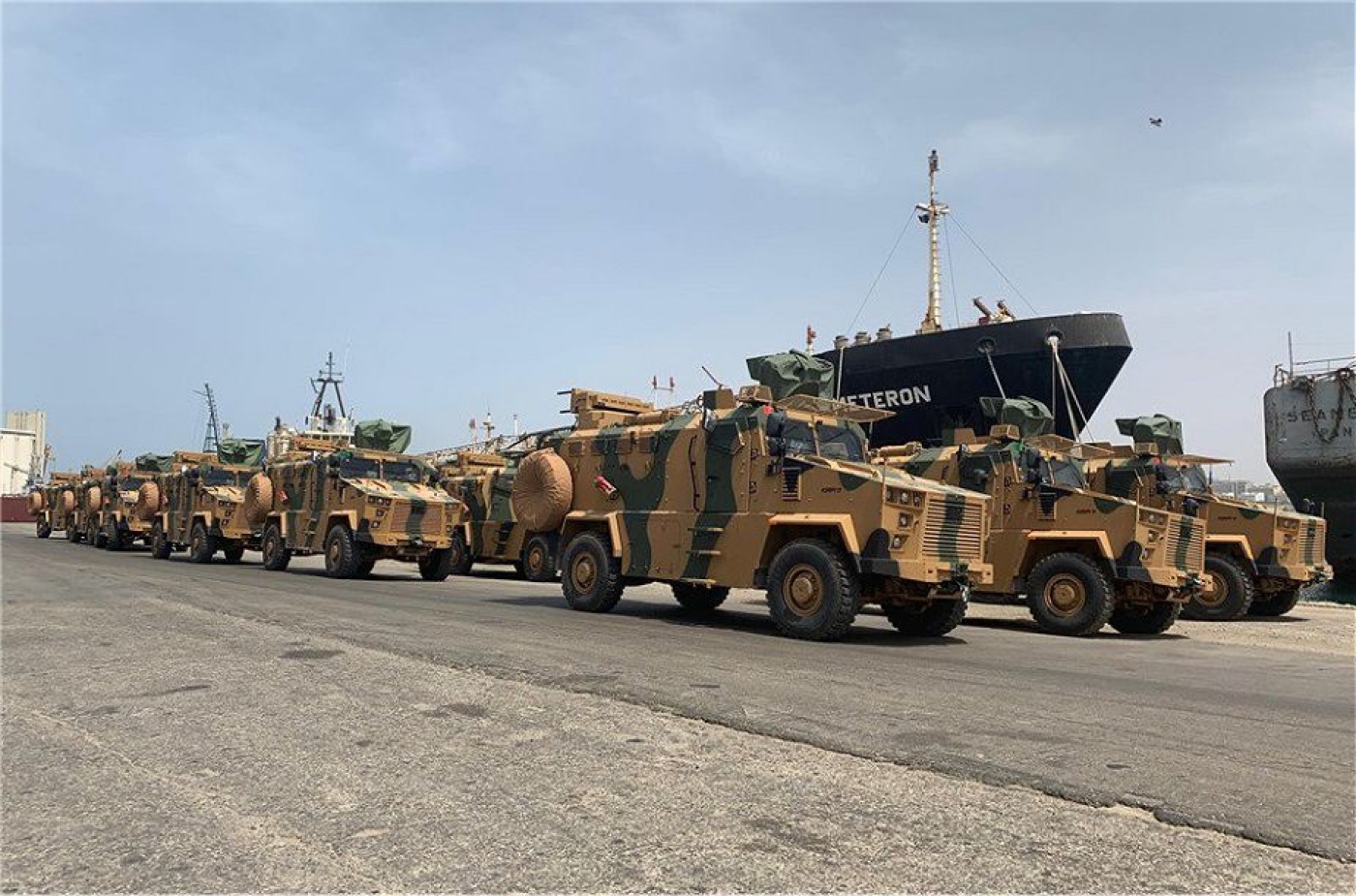
Turkey’s assistance plans for the near future also involve the deployment of the air defense early warning command and control system HERIKKS, the fire support automation system ADOP and the tactical area communications system TASMUS. Such equipment would help set up a joint air, sea and ground operational scheme in Tripoli, beefing up the GNA’s capabilities in terms of command, control, communication, intelligence, surveillance and reconnaissance (C4ISR), which currently constitute the main shortcoming in Tripoli’s defense. The Milkar-3A3 and Koral systems would be used to protect Tripoli’s urban center in an effort to limit, delay or prevent air and missile attacks from Hifter’s forces and jam their radars and radio communication.
Turkey also plans to establish an operations center, headed by a lieutenant general from the Turkish land forces and comprising officials from the land, naval and air forces, with the aim of coordinating Tripoli’s air and ground defenses. In this context, the number of Turkish soldiers in Libya will likely grow in the coming days, solely for defensive and C4ISR purposes. Because of the cease-fire effort, Ankara’s current plans do not involve any military deployment for combat purposes.

Ankara apparently plans to divide Tripoli into three zones and deploy rebel groups brought from Syria to each zone for combat tasks. The three groups are the Sultan Murad Division, Firqat al-Hamza and Firqat al-Mutasim, all affiliated with the Turkish-backed Free Syrian Army. Using the time the cease-fire would provide, Ankara intends to build rapport between the Syrian groups and the GNA forces and erect well-fortified defensive perimeters at Abu Salim in the south of Tripoli, Tajura in the east and Arada in the southeast of the city.
According to Syrian Observatory for Human Rights sources, nearly 2,400 fighters have been already shipped to Tripoli, while nearly 1,700 other recruits arrived in Turkey to undergo training courses. Recruitment spreads widely in Afrin, areas under control of “Euphrates Shield” factions and NE Syria region. The volunteers are fighters of the factions Al-Mu’tasim Division, Sultan Murad, Suqur Al-Shamal Brigade, Al-Hamzat, Al-Sham Corps, Suliman Shah and Samarkand Brigade. Turkish officials and media sources either gloss over, or totally ignore such reports, focusing on creating links between obvious Haftar allies and illegal arms transfers. They point to US and Chinese stores found in Haftar’s arsenals seized in the recent loss of the NLA of the town of Gharyan.

On the other hand, there are questions concerning the capacity problems Turkey’s Air Force is facing. The distance between the two countries is preventing Turkey to conduct effective air operations in the Libyan airspace. Turkey’s hopes to use neighboring countries as logistical routes and bases were also dashed by the staunchly neutral positions of Tunis and Algeria. Ankara’s road map with Libya derailed when several deterrent factors came into play preventing President Recep Tayyip Erdogan to realize his plans to dispatch military troops to the war-torn country despite the parliamentary approval he obtained Jan. 2.
In addition, another factor driving Ankara’s change of heart is Turkish public opinion. According to a survey published last week, only 34% of the public favors military deployment in Libya. Among sub-groups, 56% of Turks who voted for the ruling Justice and Development Party favored military deployment. In contrast, public support for operations Olive Branch and Peace Spring in Syria stood at about 75% and 82%, respectively. In other words, a larger deployment in Libya, particularly for combat missions, would be a politically risky move for Presedent Erdogan.
The Agreement on Maritime Boundaries
President Erdogan argues that he is defending Turkey’s interests but he often confuses those interests with his own doctrinal leanings, which forbid him from abandoning his doctrinal brothers’ armed groups, because they seem to be fighting in defence of their ideological line, while, in fact, they are trying to prevent the return of a united Libya for fear of losing the privileges and benefits that they are enjoying under the Government of National Accord (GNA). This government might have the legitimacy of international recognition by its side but it is clearly a weak and vulnerable government.
Those groups are isolated and besieged and naturally would welcome Turkish intervention as a feverishly sought lifeline that would enable them to prolong the war and force the international community to impose a settlement that guarantees them a sizeable portion of the Libyan pie. Mr. Erdogan wants to have a place in that party, with the signed MoU between GNA and his government.
Turkey ramped up its involvement in Libya after signing deals with the Tripoli government in November that also lend weight to Turkey’s claim to jurisdiction over an expansive area of the Eastern Mediterranean that overlaps with Greek and Cypriot claims.
Turkey wants the economic access and strategic corridor linking its coastline to Libya. This is no small amount of water because it bypasses Cyprus and Greece across 800 km. of open water to an area of Libya controlled by Haftar’s forces. In essence, Turkey swept in to strong-arm Libya’s official government because it is weak and Turkey knows that only this government can sign away areas it doesn’t even control.

If Erdogan had chosen to stick Turkey’s nose in a conflict that is not in line with its interests, it must be because he had wanted to prove to the Turkish people that he was able to invest in the conflicts of others in the service of Turkey’s interests, not to mention the aura of glory and power that would surround Turkey’s head.
President Erdogan wants to prove to his opponents and sceptics that, under his leadership, the new Turkey is the strongest. He has played that role whenever challenged by an internal crisis. He refurbished his public image many times by making up external crises he knew beforehand that he would win. This is how he politically survived internal crises.
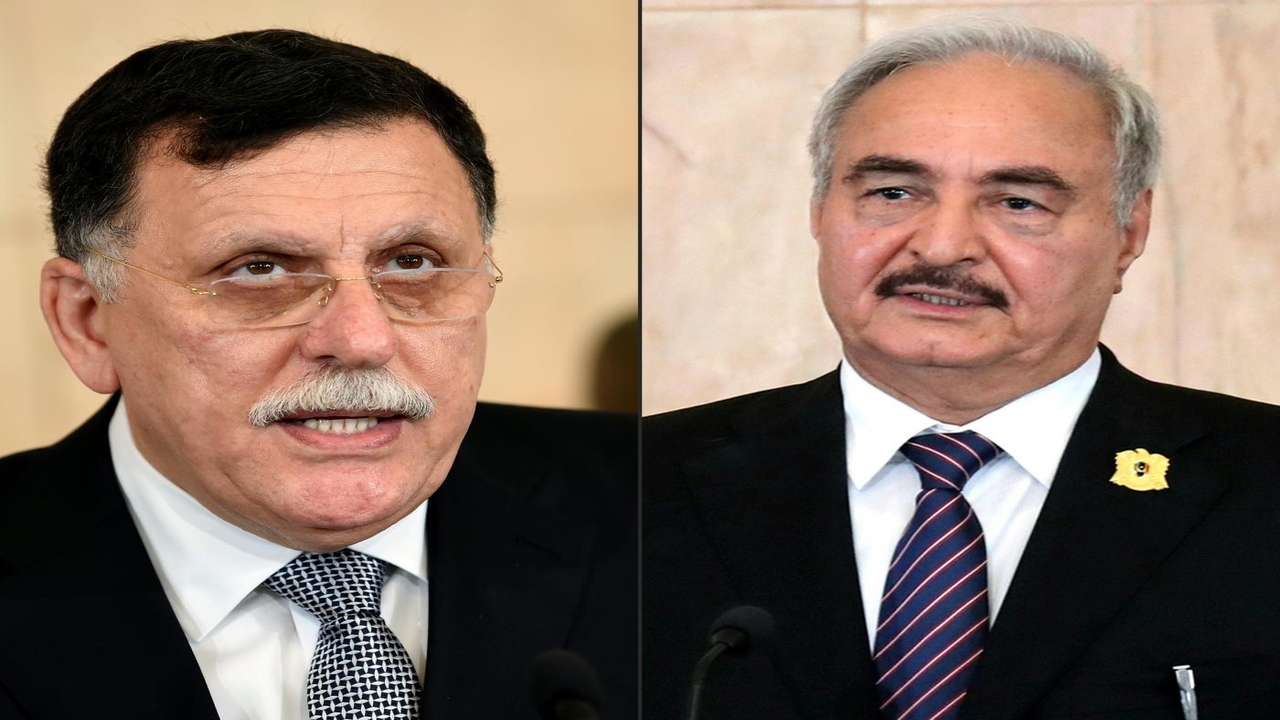
In any case, the cease-fire in Libya is still fragile. The GNA wants Haftar’s forces to retreat to their April 2019 positions, while he insists the diplomatic talks must start on the basis of existing positions. Of note, LNA forces captured the key coastal city of Sirte in early January. Their control also extends to areas about 15 kilometers (9 miles) south of Tripoli. Pulling back to the positions of April 2019 would mean forfeiting territorial gains.
Unravelling plans on Domination in Eastern Mediterranean
Ankara eyes Eastern Mediterranean as an area “where [there is a] major incongruence between energy interests and current foreign policy choices.” Within the framework of its new energy (in)security architecture owing to the emerging trilateral partnerships in the Eastern Mediterranean, this is especially true for Turkey with an additional dimension: sovereignty claims. It is increasingly anxious over the new trilateral partnerships, as well as the East Med Gas Forum (EMFG), which it feels threaten its own efficient exploitation/transmission of the Eastern Mediterranean gas discoveries. In particular, developments in recent years pose the following risks for Turkey: It may find itself outside geopolitical partnerships and other processes in the Eastern Mediterranean, observing -without any possibility of intervening in- the geopolitical and economic upgrade of Cyprus, and it may be sidelined in any energy planning, although the size of the oil and gas deposits and the region’s transformation into an energy hub are still uncertain issues today.
Turkey raises the stakes dispatching survey and drilling ships in disputed waters…
For months it has been clear that sooner or later Ankara would proceed with actions aiming to ensure that it has a place on the energy map of the Southern Mediterranean. Turkey’s moves is a gradual effort to entrench its demands in the region and to test the resolve of parties with interests in the region and especially Cyprus’ EEZ, such as the United States, Israel, Egypt, Greece, France and Italy.

Turkey’s organized plan for domination in Eastern Mediterranean, presented by the Turkish Petroleum Corporation (TPAO) to the Turkish government, was drafted in cooperation with the ministries of Foreign Affairs and Defense. It foresees an intensification of the Turkish navy’s presence throughout the Eastern Mediterranean basin. It also stipulates continuous exploratory and drilling activities within the EEZ of Cyprus, while also calling for pressure to be brought to bear on Qatar to withdraw state-owned Qatar Petroleum from the consortium with US company ExxonMobil, which is active in block 10 of Cyprus’ EEZ.
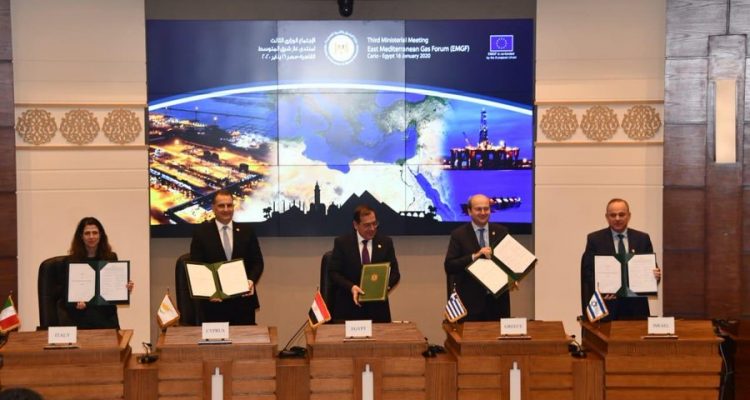
On the other hand, the East Med Gas Forum (EMGF) foundation charter was signed, January 16, in Cairo by Egypt, Cyprus, Greece, Israel, Italy, Jordan and Palestine, with the participation of France and US strong support. All countries participating in the EMGF agreed that natural gas can be used as a tool for peace and not the creation of conflict. The Turkish Foreign Ministry characterized it as “an unrealistic formation” and stressed that the forum -established by some countries with political motives- is dreaming of leaving Turkey out of the energy equation in the Eastern Mediterranean.

The very same day, in order to enhance the above position, President Erdogan announced that Turkey would start granting licenses for exploration and drilling in the Eastern Mediterranean in 2020, in accord with a maritime agreement with Libya. He said Turkey’s Oruc Reis ship would begin seismic activities in the region, which is disputed by Greece, ignoring Greek PM Mitsotakis’ statements that Greece has the means to respond to any efforts by Turkey to drill for natural gas reserves in the area between the island of Kastelorizo and off the coast of Southeastern Crete.
On top of this, Energy and Natural Resources Minister Fatih Donmez followed mr. Erdogan’s announcement, saying that Turkey’s ultra-deepwater drillship Yavuz, will start its drilling activities in Lefkosia-1 offshore hydrocarbon field, offshore northern Cyprus in the Eastern Mediterranean Sea.

United States intention to get involved at the diplomatic level, was declared by Secretary of State Mike Pompeo, at a dinner he and Vice President Mike Pence held in honor of Prime Minister Kyriakos Mitsotakis’ visit to Washington. The turkish intentions, however, mobilized US reactions even more, with Secretary of State senting a letter to Greek Prime Minister Kyriakos Mitsotakis saying that “The US remains committed to supporting democracy, prosperity and security in Greece,” describing bilateral ties between the two NATO allies as “extraordinary.” Moreover, State Department issued a statement condemning drilling operations off Cyprus, including plans to dispatch the drill ship Yavuz south of Limassol, as a provocative step which raises tensions in the region and urging Turkish authorities to halt these operations. The statement cocluded, reiterating the US position that only the Republic of Cyprus can assert maritime claims from the territory of Cyprus.

These developments proved true Nicosia’s fears that, in a bid to heighten tensions, Ankara would send a drillship to the island’s south, to Block 8, a move that would likely create practical problems for Cyprus’ energy program. Athens shares the same concern, not to say certainty, that Ankara will test Greece’s resolve by sending a seismic vessel to a maritime block inside the Libyan EEZ as claimed in the recent pact. This will create a precedent within the zone, which Greece says for the most part lies within Crete’s continental shelf. Whether TPAO, with the aid of the Turkish Navy, tries to conduct energy exploration further North -particularly in the area from Kasos and Karpathos to Rhodes and Kastellorizo- while Greece has reitterated at the highest level, that will do everything necessary to stop such aggressive action, it will be evidence of Ankara wanting to escalate tension in the direction of militarizing the crisis.
The future direction of events is likely to depend on the extent of turkish growing (in)security as well as international pressure. There are concerns that Turkey will certainly make these fresh moves in the Eastern Mediterranean in order to stay ahead of any development either in Libya, or sanctions from U.S.A.
Turkey’s overseas military bases
Indeed, President Erdogan dreams Turkey as a regional power that it can project and impose its presence thousands of kilometres away from Turkish territory.
Turkey has established several overseas military bases in both the Middle East and Africa in recent years. This enables Ankara to deploy sizeable air, ground and naval assets to strategically important regions far beyond its own borders and challenge its regional rivals -primarily Saudi Arabia and the United Arab Emirates (UAE)- in several key areas. However, Turkey faces a main obstacle in maintaining its overseas bases, which is “accessibility”, since the Red Sea and Gulf could easily be closed by Egypt, Saudi Arabia and the UAE.
Turkey has military forces stationed in several countries beyond its own borders. It has troops in neighbouring Iraq and Syria as well as in the Persian Gulf, Red Sea and the Horn of Africa. In most of the countries where it currently stations forces, has done so under agreements with the host governments.
Ankara has formal expeditionary bases in Qatar, Somalia, northern Cyprus and Sudan along with “informal activities in Tripoli, Libya” where Turkey supports and arms the Government of National Accord (GNA) against the UAE-backed Libyan National Army (LNA).

- Turkey’s military presence in Syria is staunchly opposed by the Syrian regime. The Turkish Army and its militia proxies occupy swathes of northwest Syria they captured from the Islamic State and Syrian Kurdish forces in four separate operations carried out in 2016-18 and 2019. The Turkish Army also maintains 12 observation posts around the Syrian province of Idlib established under the Astana Agreement with Russia and Iran.
- In northern Iraq, Turkey’s presence at a training camp in the Nineveh town of Bashiqa drew the ire of Baghdad in December 2015 when Ankara deployed extra forces without its permission. Turkey also has dozens of forward operating bases in Iraqi Kurdistan, which it uses to support its operations against the Kurdistan Workers’ Party (PKK) in the mountains of that autonomous region.
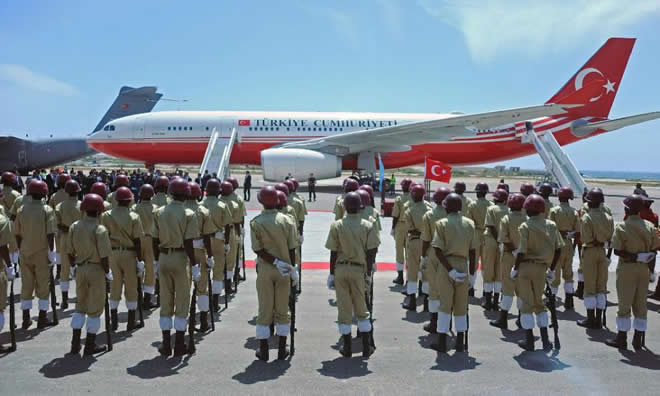
- Qatar’s military base gives Turkish troops a foothold in the Gulf. When the Saudis and Emiratis spearheaded a major blockade against Qatar in the summer of 2017, Turkey bolstered its troop presence there in a clear show of support for its ally.
- In Somalia, Turkey established a large military base in the capital Mogadishu to train Somali soldiers. It costs an estimated $50 million and can train about 1,500 Somali soldiers at a time to help Mogadishu combat the Al-Shabaab group.
- In Cyprus, Turkey maintains approximately 40,000 troops in the internationally unrecognised Turkish Republic of Northern Cyprus and there have been reports that it is also contemplating building a naval base there, which would likely be opposed by most of the international community since it would fatally undermine any already remote prospect of Cypriot reunification.
- In parallel, Turkey’s overseas naval installations directly challenge the power of Egypt-Saudi Arabia-United Arab Emirates alliance. The military entrenchment of Turkey in the Horn of Africa, the Turkey-Qatar versus Egypt-Saudi Arabia-UAE competition has created an incendiary fault-line that now encompasses the entire Eastern Mediterranean-Red Sea maritime corridor. Turkey’s overseas naval and maritime installations are an essential part of Turkey’s efforts to expand its soft power influence as well as its hard power projection. Turkey often develops its military partnerships within the context of aid and development packages. The size and naval capabilities of these various overseas facilities vary greatly.
Unless Turkey’s policy orientation changes, Ankara will continue to pursue its interest in overseas installations. One of Turkey’s main concerns is expanding the market for its arms industry. Turkey is deepening its relationships with various nations through weapons sales. Some of these relationships may result in more overseas military facilities for Turkey.
Erdogan’s long-term strategy
President Erdogan wishes to be a key player amid the geopolitical changes in the Middle East and the Eastern Mediterranean, and Turkey to acquire regional superpower status. This observation underlines a remarkable weakness in the set-up of the January 19 Berlin Conference on the Libyan conflict. In a monumental error, the German government declined to invite Tunisia, which borders Libya and has a massive stake in seeing the conflict resolved, and Greece, which is a key player in the quagmire developing in the Eastern Mediterranean.

The international community’s inability or unwillingness to understand President Erdogan’s intentions hanged over the gathering in Berlin, eroding hopes for a solution to the conflict. Germany’s diplomatic move was clouded by a simple fact: By inviting the Turkish side, the European Union, in general terms, is welcoming a fait accompli signed by Ankara, by its sending jihadist mercenaries onto Libyan soil. This has emboldened mr. Erdogan, who raised the stakes by declaring that Turkish troops would be sent to Libya. Once this is done -and he is a man of his word- the European Union would lose more influence in Libya, with the threat of jihadism rising, and mr. Erdogan may feel much more comfortable making new demands, gaining more political territory.
Some may argue that President Erdogan’s manoeuvre will not work in Libya, that it is one step too far for the international community to tolerate. There is likely some truth to that. How Turkey will be able to send troops to a distant country across the Mediterranean is a big question. Whether or not the large-scale opposition to the move at home will bring new momentum against him is another one.

Nevertheless, the Turkish leader calculates that, as long as his divisive policies within the European Union are successful, general confusion in Berlin, Rome and London continues, the broken chain of decision making in Washington remains unrepaired and international “legalistic” support for the Tripoli-based government persists, he will be given enough time to put a foothold in Libya, making Turkey’s military presence there permanent. This will give him a bargaining chip in the country and, ultimately, see him emerge as the leader who forges control of the Muslim Brotherhood ideology, maintaining the “balance of terror,” to use a Cold War term, in North Africa.
This is exactly the core of the dilemma facing the European Union -especially France, Italy and Greece in its southern flank: First, for Erdogan, the agenda is to expand on a blend of Islamism and radical nationalism beyond Turkey’s borders. Second, what Germany represses in its collective unconscious is that Turkey’s foreign policy is nearly entirely militarised and it is no longer interested in diplomatic tactics. In fact Turkey, with its weakening attention on diplomacy and peaceful resolution of conflicts, also loses its soft power capacity. It would not be unfair to suggest that this new approach of Turkey in the region is perceived like “gunboat diplomacy.”
Any hope that Ankara will make a U-turn and give up on its deal with Tripoli without serious concessions from the European Union or accept to sit at the table with Cyprus on Eastern Mediterranean energy talks is nothing but a pipe dream.
Third, what Nicosia and Athens faces deep anxiety about is how determined Ankara is to escalate the conflict in the Aegean and Eastern Mediterranean to its breaking point. The Greek Defence Ministry’s General Staff said Turkish military aircraft violated Greece’s airspace 4,811 times in 2019, the largest number in one calendar year since 1987. Turkish Navy warships have increasingly violated Greece’s national waters as well. The number of violations increased from 133 in 2010 to 299 in 2015 to a staggering 2,032 in 2019.

The crisis encompassing the Eastern Mediterranean and Libya reminds the pre-WWII period, and reveals an unsettling fact as well: There is a deadly game being played. Irrational adventurism is seeing jihadists deployed to a conflict zone and a regional power, Turkey, seems to be seeking to trigger a military confrontation with Greece. The choice will be whether or not the world acts together to deter militaristic expansion. Perhaps it is time for US and EU warships to intensely patrol the hot waters of Eastern Mediterranean.


